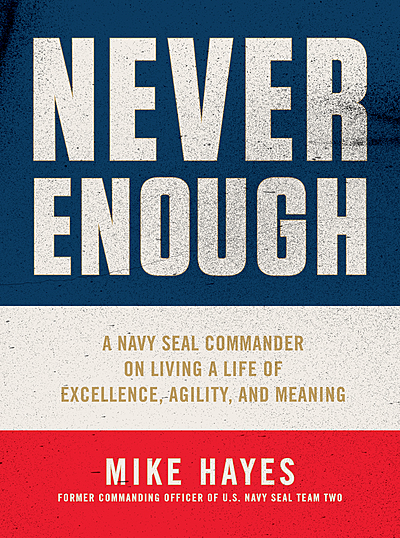When I was growing up, my grandfather would tell me how his faith had helped give him strength at Pearl Harbor, how it had compelled him to drive toward the water instead of racing in the other direction. I believe with every fiber of my being that he—and God—watched over me and guided my decisions in the field that night, as they’ve done for my entire life. That belief gave me strength so often in my service, and it gives me strength so often now.
But here’s the thing: for me, it’s faith; for you, it could be anything. It’s not the specifics of my belief that matter in terms of helping me better my life and making me more effective in everything I do—it’s the fact that I believe in something, that there’s a core set of values driving my actions, an ethos I strive to live by, a North Star guiding me in the right direction, keeping me on the right track, or steering me when I fall short. We all fall short, inevitably, but what matters is how we handle those moments, and whether we can get back on course. There are men and women of all faiths—and of no organized faith at all—who have those kinds of values driving them, who lead exemplary lives of character and strength, who inspire those around them, and who take on missions that serve all of us.
If you have that kind of belief system in place, good for you. If not, it may take some hard work and introspection to figure out what truly motivates you, what you trust, and what ultimately matters most. There are three parts, as I see them, to the journey to imbue your life with meaning, and that’s what this chapter— and, really, this entire final section of the book—is about: first, we all have to believe in something; second, we have to identify and actually go out and do the things that are meaningful to us; and third, we have to realize that we can never predict the future, so we have to make decisions for now instead of waiting for a better time that may never come.
Where do you turn when you need help? Who gives you answers when you don’t even understand the questions? What gives you the strength to put one foot in front of the other on the hardest days of your life?
Before I went off to lead SEAL Team TWO in Afghanistan, I had never before been responsible for the lives of so many individuals, in so many respects. There were about to be two thousand people under my command, each depending on me to make sure they came home safely—not to mention the family members waiting anxiously for their return. This hit home for me when I made an advance trip to visit the region I’d be commanding, as key leaders always do, to get the lay of the land and better understand the mission. Extensive pre-deployment training to figure out how to prepare with maximum efficiency to achieve the goals of the war and at the same time minimize risk is always a key part of SEAL command.
The feeling of responsibility for the lives of others isn’t limited to the military, of course. Frank D’Souza is one of the exceedingly rare individuals who have founded a company and built it into a Fortune 200 enterprise. Before he stepped down as CEO of Cognizant after his twenty-fifth year of leadership, he and I talked about how much time he spent considering his role in the lives of the 280,000 people (and more than a million over time) he employed. We talked through a particular thought exercise I remember vividly: If a company merely covers its costs and creates shareholder value, is it worth it? Frank and I agreed that creating a firm that employs so many thousands of people and contributes in such a meaningful way to global productivity would be a wonderfully satisfying way to spend a life. Of course, Cognizant generates more than two billion dollars a year in free cash flow, so the exercise was merely theoretical. It did, however, emphasize to me the “people first” servant-leader orientation that is so important to hold in any organization.
One more story: When I turned sixteen, my grandfather offered me what he called “the best present in the world.” He handed me a package, and as I peeled away the wrapping paper, I saw a framed sheet of paper, a poem he had typed up for me. At the bottom, he had written: “Michael, my father made me memorize this poem as a young boy because he felt this, above all others, embodied what it means to be a man. I hereby pass this to you and encourage you to turn to these words when things get difficult.
The poem was Rudyard Kipling’s “If,” which begins:
If you can keep your head when all about you
Are losing theirs and blaming it on you,
If you can trust yourself when all men doubt you,
But make allowance for their doubting too;
If you can wait and not be tired by waiting,
Or being lied about, don’t deal in lies,
Or being hated, don’t give way to hating,
And yet don’t look too good, nor talk too wise
I wrote in chapter 2 about the day the Taliban shot six children and blamed it on us and my family member at home was simultaneously having a medical crisis. I was as overwhelmed with stress as I’d ever felt, and reached out to my incredible second-in-command and close friend, Rocky. He promised he would watch out for me.
Not two hours after our conversation, an email from Rocky appeared in my inbox. No words, just a cut-and-paste of that very same Rudyard Kipling poem staring back at me from the screen. No one but my wife, siblings, and parents knew about my grandfather’s gift to me twenty-five years earlier. I felt such astonishment and emotion in that moment. For me, it was yet another sign that my grandfather was looking down from above.
I never shared these stories with my teammates. I was afraid I’d risk losing the trust I’d built up with those who didn’t share my beliefs, that they would somehow see my faith in God as compromising my ability to lead us through the very real dangers we faced, which weren’t going to be resolved by divine intervention. I worried they would judge or reject me, and it would hamper my ability to be the most effective Commander I could be. Perhaps I didn’t have enough conviction to trust that my beliefs were part of what made me strong—or at least to trust that others would see it that way.
I see things a little differently now, with hindsight. I wish I’d shared more, and I wish others had shared more about the beliefs that kept them focused on what was most important in life. Diversity of faith isn’t something we always think about in the same way we think about all the other diversities we need to celebrate, but it’s just as critical. Sharing our beliefs with others, baring our truest selves, finding common elements and bonding because of them can be so powerful, especially in the high-stakes environment of battle.
It’s not that I think all beliefs are interchangeable. But there are far more elements that tie our beliefs together than divide us. No matter what you call yourself—religious or not, or whichever religion you hold in your heart—virtually all of us can stand up proudly for the ideas of forgiveness, tolerance, respect, putting others before self, trying to be the best person we can, and living the best life we can live. I don’t know that my beliefs are the truest form of truth any more than I can guarantee someone else’s aren’t. But I do think that having those beliefs, whatever they are, and living by them can bring us all closer to finding meaning in everything we do—and sharing them can bring us closer together.

You will find more incredible advice, insights, stories, and inspiration in Never Enough: A Navy
SEAL Commander on living a life of Excellence, Agility, and Meaning.



